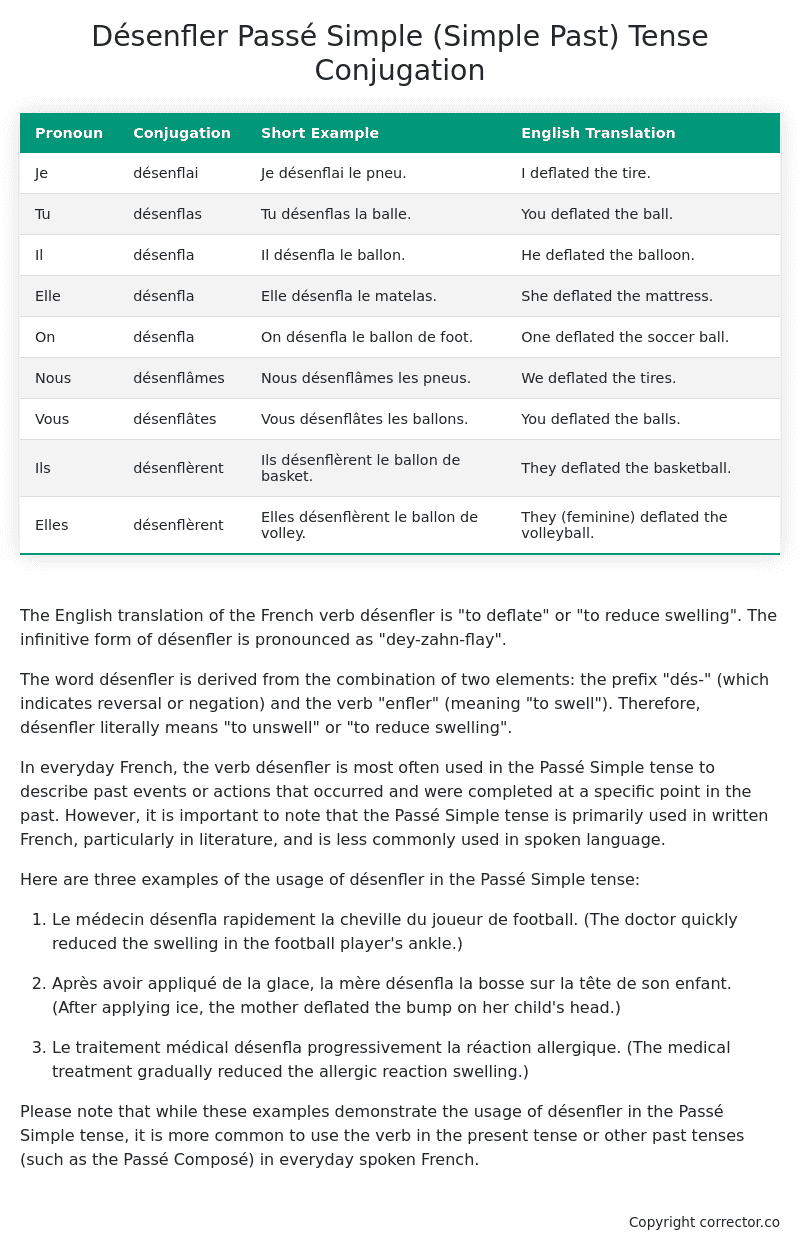Passé Simple (Simple Past) Tense Conjugation of the French Verb désenfler
Introduction to the verb désenfler
The English translation of the French verb désenfler is “to deflate” or “to reduce swelling”. The infinitive form of désenfler is pronounced as “dey-zahn-flay”.
The word désenfler is derived from the combination of two elements: the prefix “dés-” (which indicates reversal or negation) and the verb “enfler” (meaning “to swell”). Therefore, désenfler literally means “to unswell” or “to reduce swelling”.
In everyday French, the verb désenfler is most often used in the Passé Simple tense to describe past events or actions that occurred and were completed at a specific point in the past. However, it is important to note that the Passé Simple tense is primarily used in written French, particularly in literature, and is less commonly used in spoken language.
Here are three examples of the usage of désenfler in the Passé Simple tense:
-
Le médecin désenfla rapidement la cheville du joueur de football.
(The doctor quickly reduced the swelling in the football player’s ankle.) -
Après avoir appliqué de la glace, la mère désenfla la bosse sur la tête de son enfant.
(After applying ice, the mother deflated the bump on her child’s head.) -
Le traitement médical désenfla progressivement la réaction allergique.
(The medical treatment gradually reduced the allergic reaction swelling.)
Please note that while these examples demonstrate the usage of désenfler in the Passé Simple tense, it is more common to use the verb in the present tense or other past tenses (such as the Passé Composé) in everyday spoken French.
Table of the Passé Simple (Simple Past) Tense Conjugation of désenfler
| Pronoun | Conjugation | Short Example | English Translation |
|---|---|---|---|
| Je | désenflai | Je désenflai le pneu. | I deflated the tire. |
| Tu | désenflas | Tu désenflas la balle. | You deflated the ball. |
| Il | désenfla | Il désenfla le ballon. | He deflated the balloon. |
| Elle | désenfla | Elle désenfla le matelas. | She deflated the mattress. |
| On | désenfla | On désenfla le ballon de foot. | One deflated the soccer ball. |
| Nous | désenflâmes | Nous désenflâmes les pneus. | We deflated the tires. |
| Vous | désenflâtes | Vous désenflâtes les ballons. | You deflated the balls. |
| Ils | désenflèrent | Ils désenflèrent le ballon de basket. | They deflated the basketball. |
| Elles | désenflèrent | Elles désenflèrent le ballon de volley. | They (feminine) deflated the volleyball. |
Other Conjugations for Désenfler.
Le Present (Present Tense) Conjugation of the French Verb désenfler
Imparfait (Imperfect) Tense Conjugation of the French Verb désenfler
Passé Simple (Simple Past) Tense Conjugation of the French Verb désenfler (You’re reading it right now!)
Passé Composé (Present Perfect) Tense Conjugation of the French Verb désenfler
Futur Simple (Simple Future) Tense Conjugation of the French Verb désenfler
Futur Proche (Near Future) Tense Conjugation of the French Verb désenfler
Plus-que-parfait (Pluperfect) Tense Conjugation of the French Verb désenfler
Passé Antérieur (Past Anterior) Tense Conjugation of the French Verb désenfler
Futur Antérieur (Future Anterior) Tense Conjugation of the French Verb désenfler
Subjonctif Présent (Subjunctive Present) Tense Conjugation of the French Verb désenfler
Subjonctif Passé (Subjunctive Past) Tense Conjugation of the French Verb désenfler
Subjonctif Imparfait (Subjunctive Imperfect) Tense Conjugation of the French Verb désenfler
Subjonctif Plus-que-parfait (Subjunctive Pluperfect) Tense Conjugation of the French Verb désenfler
Conditionnel Présent (Conditional Present) Tense Conjugation of the French Verb désenfler
Conditionnel Passé (Conditional Past) Tense Conjugation of the French Verb désenfler
Conditionnel Passé II (Conditional Past II) Tense Conjugation of the French Verb désenfler
L’impératif Présent (Imperative Present) Tense Conjugation of the French Verb désenfler
L’impératif Passé (Imperative Past) Tense Conjugation of the French Verb désenfler
L’infinitif Présent (Infinitive Present) Tense Conjugation of the French Verb désenfler
L’infinitif Passé (Infinitive Past) Tense Conjugation of the French Verb désenfler
Le Participe Présent (Present Participle) Tense Conjugation of the French Verb désenfler
Le Participe Passé (Past Participle) Tense Conjugation of the French Verb désenfler
Struggling with French verbs or the language in general? Why not use our free French Grammar Checker – no registration required!
Get a FREE Download Study Sheet of this Conjugation 🔥
Simply right click the image below, click “save image” and get your free reference for the désenfler Passé Simple tense conjugation!

Désenfler – About the French Passé Simple (Simple Past) Tense
Formation
Usage
Narration
Historical Context
Interactions with other tenses
Passé Composé
Imparfait
Conditional and Subjunctive
Summary
I hope you enjoyed this article on the verb désenfler. Still in a learning mood? Check out another TOTALLY random French verb conjugation!


